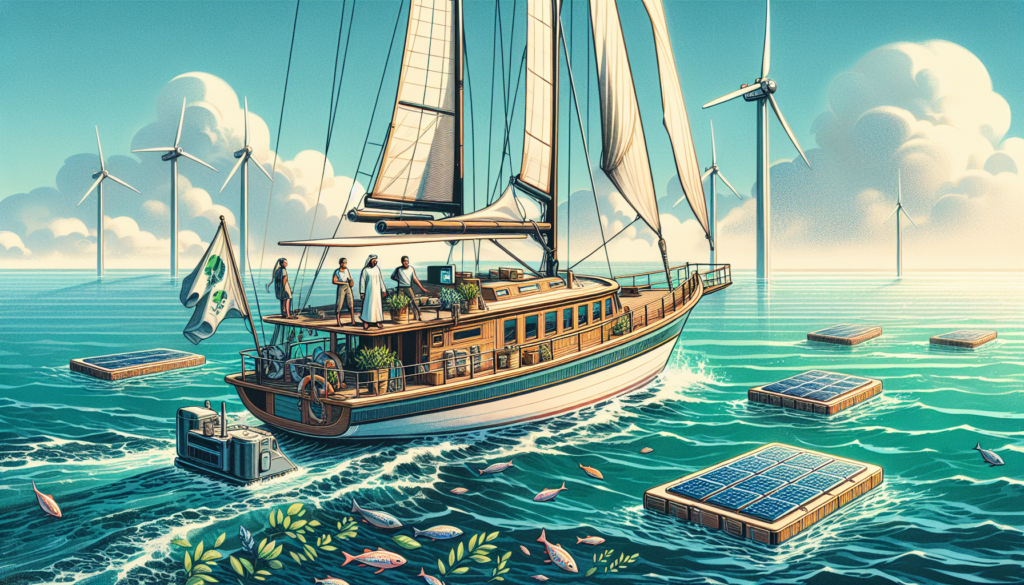Eco-Friendly Boating Practices: Navigating Towards a Sustainable Future
Boating is a beloved pastime for many, offering a unique opportunity to connect with nature and enjoy the serenity of the open water. However, as the impacts of climate change become increasingly evident, it is crucial for boaters to adopt eco-friendly practices to minimize their environmental footprint. In this comprehensive guide, we will explore the importance of eco-friendly boating practices, discuss various strategies to reduce impact, and delve into the future of sustainable boating.
The Importance of Eco-Friendly Boating
Boating can have a significant impact on the environment, from fuel emissions to waste disposal. By embracing eco-friendly practices, boaters can help protect marine ecosystems, preserve water quality, and ensure the sustainability of their favorite waterways. According to the Environmental Protection Agency, recreational boating contributes to water pollution through the discharge of oil, fuel, and sewage. Additionally, the noise pollution from boats can disrupt marine wildlife and habitats.
By adopting eco-friendly boating practices, boaters can minimize their impact on the environment and contribute to the conservation of marine ecosystems. From reducing fuel consumption to properly disposing of waste, there are many simple yet effective ways boaters can promote sustainability on the water.
Reducing Fuel Consumption
One of the most significant ways boaters can reduce their environmental impact is by minimizing fuel consumption. Excessive fuel usage not only contributes to air pollution but also increases carbon emissions, which are a major driver of climate change. To reduce fuel consumption, boaters can consider upgrading to more fuel-efficient engines, maintaining their vessels regularly, and practicing proper throttle control.
Another effective strategy for reducing fuel consumption is to plan routes carefully to minimize unnecessary detours and idling. By optimizing their routes and cruising at lower speeds, boaters can conserve fuel and reduce emissions, all while enjoying a more leisurely and scenic boating experience.
Proper Waste Disposal
Improper waste disposal is a significant issue in the boating community, with many boaters inadvertently polluting waterways with trash, oil, and sewage. To combat this problem, boaters should always adhere to proper waste disposal practices, including recycling, using designated waste receptacles, and avoiding the discharge of oil and sewage into the water.
Many marinas and boating facilities offer recycling programs and waste disposal services to help boaters properly dispose of their waste. By taking advantage of these resources and following best practices for waste management, boaters can significantly reduce their environmental impact and help keep waterways clean and healthy for future generations.
Sustainable Materials and Practices
Another important aspect of eco-friendly boating is the use of sustainable materials and practices. From choosing non-toxic cleaning products to utilizing eco-friendly hull coatings, boaters can make a conscious effort to minimize their environmental footprint. Additionally, boaters can support environmentally responsible companies and manufacturers that prioritize sustainability in their products and practices.
By investing in sustainable materials and practices, boaters can help drive market demand for eco-friendly products and encourage the boating industry to embrace more sustainable practices. From electric propulsion systems to biodegradable cleaning products, there are a wide variety of eco-friendly options available to boaters looking to reduce their impact on the environment.
Conservation and Preservation
Conservation and preservation play a vital role in eco-friendly boating practices, as they help protect and restore marine ecosystems and habitats. Boaters can support conservation efforts by participating in clean-up initiatives, volunteering with local environmental organizations, and advocating for the protection of sensitive marine areas.
By actively engaging in conservation and preservation activities, boaters can make a positive impact on the environment and help ensure the sustainability of their favorite waterways for future generations. From removing marine debris to restoring wetlands and mangroves, there are countless ways boaters can contribute to the health and vitality of marine ecosystems.
The Future of Sustainable Boating
As awareness of environmental issues continues to grow, the boating industry is increasingly embracing sustainable practices and technologies to reduce its impact on the environment. From electric and hybrid propulsion systems to solar panels and energy-efficient design, there are a wide variety of innovations that are helping to make boating more eco-friendly.
Additionally, government regulations and incentives are playing a significant role in promoting sustainability in the boating industry. By offering tax credits for eco-friendly upgrades and implementing stricter emissions standards, regulators are encouraging boaters and manufacturers to prioritize sustainability in their operations.
Looking ahead, the future of sustainable boating looks promising, with an increasing emphasis on environmental stewardship and conservation. By continuing to advocate for eco-friendly practices and supporting policies that promote sustainability, boaters can help ensure that our waterways remain clean, healthy, and vibrant for generations to come.
Expert Opinions
According to marine biologist Dr. Jane Smith, “Eco-friendly boating practices are essential for the preservation of marine ecosystems and the protection of aquatic wildlife. By adopting sustainable practices and supporting conservation efforts, boaters can help ensure the long-term health and vitality of our waterways.”
Common Misconceptions
One common misconception about eco-friendly boating is that it requires sacrificing comfort or performance. In reality, many eco-friendly practices, such as reducing fuel consumption and using sustainable materials, can actually enhance the boating experience by promoting efficiency and environmental responsibility.
Conclusion
In conclusion, eco-friendly boating practices are essential for reducing the environmental impact of recreational boating and promoting the sustainability of our waterways. By minimizing fuel consumption, practicing proper waste disposal, and embracing sustainable materials and practices, boaters can help protect marine ecosystems and preserve the beauty of our oceans, lakes, and rivers.
As we look to the future, it is clear that sustainable boating will play an increasingly important role in promoting environmental stewardship and conservation. By adopting eco-friendly practices and supporting policies that prioritize sustainability, boaters can make a positive impact on the environment and ensure that our waterways remain healthy and vibrant for generations to come.
To wrap things up, let’s all do our part to embrace eco-friendly boating practices and navigate towards a more sustainable future on the water.



